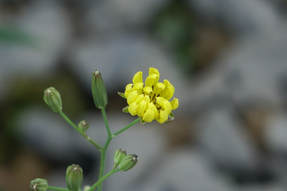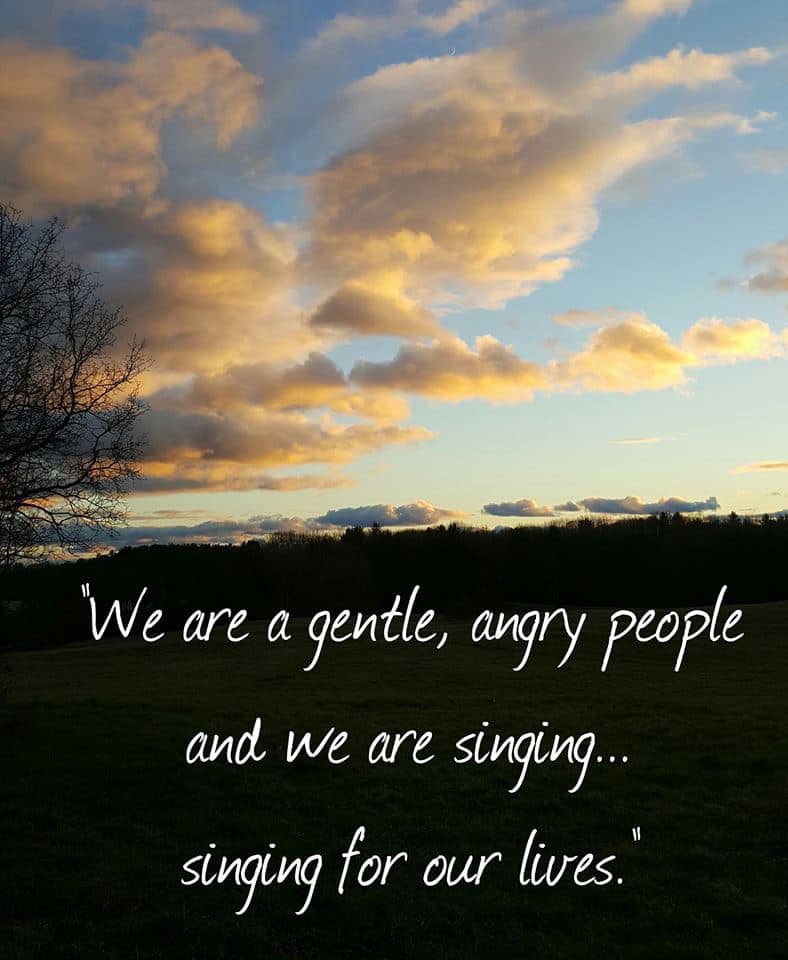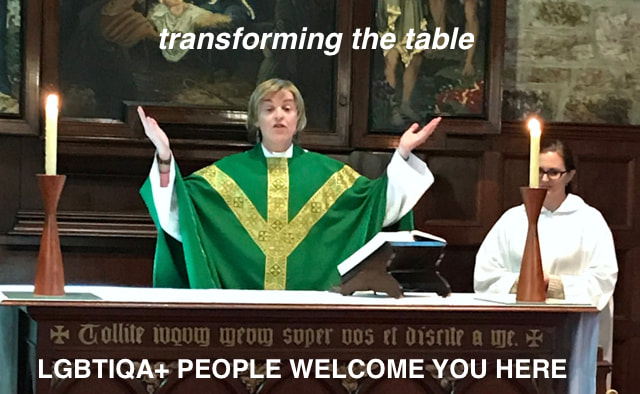|
I’m angry again today - and with good reason, especially having just read a particularly heart wrenching cry of anger from an Anglican priest who has expressed so well their own anger at ‘straightsplaining’ so-called allies and the appalling personal cost upon him (I know, I feel and empathise with that pain on every level). As he says, we can usually cope with much of the reactionary stuff but it is what I call (straight and narrow) ‘passive inclusion’, accompanied by the continual injunctions (by those with comfortable privilege) to continuing ‘patience’, ‘calm’, and ‘good (aka cheap) grace’ that really burdens and eats away at souls, lives and ministries.
One of the things Churches really struggle with is anger - not least Anglicans (born of ‘moderating’ control and English upper/middle class ‘restraint’) and (in my experience) often worse still, the Uniting Church (born of the bureaucracy and functionality that contains its own particular restricted range of Christian diversity). Yet too much of even the best of mainstream Church life has stoked, and continues to stoke, anger which needs to be properly acknowledged, heard and engaged with (not least by empowering, not silencing or sidelining, the huge gifts queer people are to every space, not least the spiritual). Sometimes I just wonder what Jesus it is that Churches read - but then personally I’ve never yet called those who hurt me ‘broods of vipers’ and the like, so perhaps I’m also failing on that score?! I don’t expect Australian Anglican avoidance and maintenance of the straight, still largely boys, club to change quickly - nor the UCA’s complacency and irritating self-satisfaction about its often pleasant but limited ‘inclusivity’. They are both changing slowly - and this week’s announcement of a queerphobic breakaway ‘Anglican’ body is partly a sign of that change and an admission of that viperous tendency’s failure to win over others. Queer people of faith (especially local Anglicans this week) will continue to do it tough in many ways, but we won’t be crushed, because we are not only essentially gentle in spirit as well as vitally angry, but we are also extraordinarily fabulous and incredible gifts to our struggling world and to any Church that will not simply ‘include’ us but celebrate with us and learn from us. As the old Judaean said, ‘those who have eyes to see, and ears to hear’… Meanwhile, some of us will keep on singing - and will also sing for those who are denied their voices, and for those who can sing no longer - for why wouldn’t we sing into being such wonderful gentle, angry, gifted, loving lives? 🏳️⚧️🌈 With huge ❤️ and 🙏 for all those doing it really tough right now. You are loved and more precious than you can ever know 😻
0 Comments
 I continue to be flabbergasted (that’s the polite way of putting it) by the attempts of Churches to ‘apologise’ to LGBTIQ+ people whilst continuing to ignore our voices, maintaining shame, and hurting us afresh. The latest astonishing ‘apology’ is by the General Synod of the Anglican Church in Australia - actually ’deploring’ activity which it had itself just demonstrated. NO - this kind of ‘apology’ is not acceptable and represents a mockery of the deep understanding of costly repentance and reconciliation in the Christian tradition. Meanwhile, the Uniting Church - with more credibility but with significant holes in its LGBTIQ+ ‘inclusion’, including a current low level of trans awareness and engagement - has also been pursuing an apology process. This is a much better concept but one in which no transgender people have been included in the ‘apology’ group! (so there’s a first apology to make) A few obvious starters therefore for such ventures: * ‘Nothing about us without us’ * Cheap grace betrays the Gospel * Reparations matter I've been troubled lately by 'inclusive' churches saying 'LGBTIQA+ are welcome here'. Such words involve good intentions but embody the problem they seek to address. For let's think about it. Do we say 'heterosexual/cisgender people are welcome here'? Or, even when we aim to tackle enduring sexism and racism, do we say 'women are welcome here', or 'black people are welcome here'? Now thankfully this is a step beyond 'all welcome here' - that now trite phrase on so many noticeboards and church communications. Like the offensive phrase All Lives Matter, 'all welcome' tends not only to erase our vibrant differences, but pays no attention to our particular experiences of power and (degrees of) acceptance. 'LGBTIQA+ are welcome here' is also better than 'we welcome LGBTIQA+ people here', which much more starkly represents the issue: differentiating 'we' - i.e those at the heart of the church community - from 'them', the sexually and gender diverse 'outsiders'. Yet it too also reflects the dominant approach of relating to sexually and gender diverse people as 'Other'. It fails to speak of the agency of LGBTIQA+ people our/themselves. It still keeps us/them in the status of guests, more or less unwelcome. It does not grasp that sexually and gender diverse people are as much the hosts and gifts of God's love as anyone else. Perhaps it is even time to leave 'affirmation' behind, and speak more directly of celebration and transformation? After all, sexually and gender diverse people are as much hosts as guests in Jesus' 'radical hospitality'...
 Jesus may have come that we ‘may have life and life in all its fullness’ (John 10.10b) but Christians frequently do a good job of seeking scarcity and restriction instead! Contemplating the sorry state of religion in many places it is not hard to see some common threads of resistance to Christ’s gospel of Abundance. It is a major reason for the rejection of Christianity among many. For the Church as a whole often clings so powerfully to prioritising reflection on death and sin above life and empowerment. This is particularly disastrous and objectionable for those, like LGBTI+ people, who have been held captive for so long by deathly categories of thought and sinful oppression. Rightly they seek life, and life in all its fullness. Asking for bread from churches however all too often results only in gifts of stone. In some ways individual Christians, and the Church in general, can often therefore appear like Ophelia in Bob Dylan’s famous ‘Desolation Row’: Ophelia, she's 'neath the window for her I feel so afraid On her twenty-second birthday she already is an old maid To her, death is quite romantic she wears an iron vest Her profession's her religion, her sin is her lifelessness And though her eyes are fixed upon Noah's great rainbow She spends her time peeking into Desolation Row...  Tomorrow is the 30th anniversary of my ordination as priest, so it seems appropriate to break what has been a (initially unintentional) five month blog fast. For as I look back and around today, reflecting on my life and vocational journey, it seems new beginnings are certainly in the air. For some time I have felt myself in a watershed period and this is certainly true of 2017 so far. Today I fly back from Vancouver, at the end of a short stay in Canada en route back from the UK. For at the beginning of June my parents marked their 60th wedding anniversary. My wife and I therefore coupled being there with a series of different work and research engagements which will hopefully bear much fruit for us and others in the next few months and years to come. As we stood awaiting our suitcases at Heathrow at the very end of May, we also received news of the birth of our first grandchild. Symbolically it was a powerful expression of new phases of life into which we, and many people and interests we share, have entered. In the next few weeks I hope to share some important aspects of changes which have opened up for us, pondering a little on the significant shifts which have taken place for us so far this year (new city, new house, new jobs, new work roles, new family roles, new relationships, new understandings of ourselves etc) and those to come. However, on the eve of my priestly ordination anniversary, it is enough to reflect briefly on a visit to the St Brigid's Community gathering at Christ Church Anglican cathedral in Vancouver last Sunday. St Brigid's is a three year old emerging church initiative, with a particular affirmation of diversity (not least of LGBTI+ people) and is apart of the cathedral's developing ministry and mission. It marked the feast of St Peter and St Paul (my ordination festival) on Sunday and I was greatly moved by the shifts of 30 years. At that time, in St Paul's cathedral in London, all was done in the style of high Anglican papalism, with a presiding bishop who shortly afterwards converted to Roman Catholicism - out of horror of female ordination - and who insisted on determined Anglo-Catholic clerical elements, including a concelebration of new priests which excluded some of different Anglican tradition. At St Brigid's, whilst surprisingly faithful to today's liturgical expectations, it was very different. The female priest presided engagingly, inviting all to reflect and contribute together on their response to the texts and themes of the day, and to gather as one around the eucharistic table. Transgender, as well as other LGBTI+ people, shared deep Christian insights, speaking from their own faith experience, embodying the new voice and confidence gradually being found even (slowly and sometimes agonisingly) in the churches. For me, it was a beautiful affirmation of so much that I have prayed and worked for over the past 30 years, and a wonderful timely encouragement to new steps into the future. Sometimes God seems particularly close, especially at times of threshold and transformation. Feeling renewed in my vocation, may the journey of grace continue for us all. I am struck by this week's collect for the end of Advent:
O Lord, raise up your power and come among us, and with great might succour us, that, whereas through our sins and wickedness we are sore let and hindered in running the race that is set before us, your bountiful grace and mercy may speedily help and deliver us; through your Son our Lord, to whom with you and the Holy Spirit be honour and glory, now and for ever. Amen. The language is clearly a modernised form of the 16th century expressions which helped form the historic Book of Common Prayer (BCP). As such, it has the kind of aural resonance that is loved many devotees of the BCP and King James Version of the Bible. For myself, though I am also a little wary of excessive use of what the Iona Community calls 'the language of the living room', such Tudor language can be often be somewhat dated for contemporary prayer and worship. However this prayer also reflects quite well certain aspects of both the character of Anglicanism and its distinctive theological outlooks. To say that, through sin and wickedness, we are 'sore let and hindered' is, for example, in my view, a less destructive view of the human condition than many. It avoids the 'total depravity' approach of Calvinism and other unbalanced conceptions. Yet it affirms the beauty and efficacious necessity of grace. As the last collect in today's main Australian Anglican Prayer Book, it is thus an appropriate lead in to Christmas. For the Incarnation affirms the embodied life of grace in humanity, essential for our redemption, yet celebratory of material existence as a whole. Pain, darkness and struggle are very real - for we are indeed 'sore. let and hindered' and typically in need of speedy help and deliverance - yet we are also participants in divine salvation and vehicles of honour and glory. Such is the miracle of Jesus Christ, born of Mary.  The Hills Hoist is one of the great Australian icons. It is in many ways redolent of much of modern Australia: happily and effectively secular, suburban and spiritually practical and pragmatic. It is simple, straightforward and sensible. It is easily owned by all cultures and backgrounds and found across the continent, from the cosmopolitan coast to regional backyards, to outback and desert landscapes. It requires no special insight, ritual or tradition. Yet the eye of faith may contemplate its cruciform design with wonder. Grounded in the sacred earth, clothed with humanity, raised to the heavens, its ordered, waiting, being is open to the dynamic grace and play of the elements, not least the sun and wind – metaphors of the life-giving Word and Spirit. Unassuming icon – heaven in ordinary. |
AuthorJo Inkpin is an Anglican priest serving as Minister of Pitt St Uniting Church in Sydney, a trans woman, theologian & justice activist. These are some of my reflections on life, spirit, and the search for peace, justice & sustainable creation. Archives
July 2024
Categories
All
|


 RSS Feed
RSS Feed